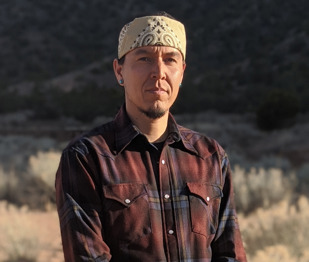Offering
by Chee Brossy
Ash is the standard mode of protection,
future tense in the prefix, action in the suffix—
the most crucial element saved for last,
for conclusion, a natural drama and hierarchy,
from man to horse to ponderosa to grass to sandstone.
My hands sting today after a fall.
Skin peels easily when ground across the coarse dirt
of a mountain trail, infects easily, secretes naturally—
a distraction, like a friend who visits and takes you
for a night out, a brief forgetting of ailments.
But it is we who must apologize,
return to the earth and make an offering
for striking her with our body—
Shimá, of course, means Mother.
There was a bird in the yard this morning,
too young and small to fly.
Flapping, stumbling, stuttering wings.
Other birds flew down in turns,
hopping beside it, then flying a short way
to alight again on the gravel, chirping,
then flying back up into the plum bush.
They were a team, saying,
See, this is the way, little stammer.
Clean thoroughly, apply ointment,
bandage, deposit wrappings in the trash.
As a mother says to her son
when the bullies have had him,
when he struggles to raise his head,
My beautiful son, my precious, precious boy.
The Navajo language is an important part of my life. I’m always trying to learn more, to add more vocabulary and phrases to my understanding. I wrote this poem during the pandemic. Suddenly we were isolated and had all this time on our hands. One thing I did with that time was take online language classes offered by our tribal colleges. Our classes would come together over Zoom. We were Navajos from all different places and walks of life during a trying time for the People when we lost relatives to the illness, and no one was left untouched. But we came together each week and tried to learn something. In the afternoons after class I would go out on hikes and runs in the mountains near Santa Fe where I was living. It was good to be outside in the land. And it was during those times of isolation and turmoil in the human world that it was easy to see the purpose and necessity of the Navajo way of life, of living within the world in its entirety, of showing respect to the natural world, which the Diné people call nihimá, our mother. It was a time to take comfort in that relationship. I will always be thankful for the understanding that came then.
 Chee Brossy was born in Chinle, Arizona. He is author of the poetry collection The Strings Are Lightning And Hold You In from Tupelo Press and the chapbook Burntwater from Finishing Line Press. His poetry and fiction have appeared in the Malahat Review, Narrative Magazine, Colorado Review, Kenyon Review, PRISM International, and elsewhere. He has worked as a reporter, basketball coach, archivist, and English literature instructor.
Chee Brossy was born in Chinle, Arizona. He is author of the poetry collection The Strings Are Lightning And Hold You In from Tupelo Press and the chapbook Burntwater from Finishing Line Press. His poetry and fiction have appeared in the Malahat Review, Narrative Magazine, Colorado Review, Kenyon Review, PRISM International, and elsewhere. He has worked as a reporter, basketball coach, archivist, and English literature instructor.